Are you happy with the current state of the world? Do you wish things could change? Do you want the world to improve? Do you want to fix the world? In this study of Ephesians 3:8-13, we discover Paul’s solution for how to fix the world. It’s a shocking, challenging proposal, but it is the plan that God has put in place since the beginning of time, and it is the only plan that God has. There is no Plan B.

Before we consider God’s Plan for How to Fix the World, we consider a question from a reader about Pentecostalism.
Question from a Reader
A new member of my discipleship group named John Redic recently sent in the following question.
What is your analysis of Pentecostalism? How should the Azusa Street Revival and Movement be assessed and interpreted?
I am not a fan of Pentecostalism.
Don’t get me wrong. I like Pentecostals. I love their passion for Jesus and their desire to see God move in their life in a meaningful and powerful way. We all want this, and I love how Pentecostals are calling for people to have a REAL experience of God in their life, rather than the dead and stiff religiosity that is so common in some forms of Christianity.
However, there is great danger in the Pentecostalism that forms the foundational theology of many Pentecostals.
I’m not going to get into the history of Pentecostalism, which the Azuza Street revivals and some of the subsequent revivals, except to say that these revivals did happen, and as with any historical revival, there was some good and some bad that came from them, but the worst thing we can do is put them on a pedestal as an experience that we should try to copy or replicate today. Whenever we try to emulate, replicate, or copy a past, historical movement of God, we end up ignoring and even missing what fresh thing God is trying to do in our own day.
But if you are not familiar with the Azuza Street revivals or Pentecostalism in general, let me just say that they were attempts by some Christians to restore to the church the powerful and supernatural workings of the Holy Spirit to the everyday lives of Christians. They wanted to experience all that the Holy Spirit has to offer.
And this is a good thing. We should all want everything that the Holy Spirit wants for us, including the knowledge and experience of all the spiritual gifts the Holy Spirit has given to us. However, I think that many dangers and problems have come along with Pentecostalism.
(#AmazonAdLink)  While I do believe that all the spiritual gifts are in use today (I have an online course available on the Spiritual Gifts if you want to learn more about my views on this … and (#AmazonAdLink) a book as well), I think that many Pentecostals put a higher degree of authority on personal experience than on careful study and explanation of Scripture. This is quite dangerous.
While I do believe that all the spiritual gifts are in use today (I have an online course available on the Spiritual Gifts if you want to learn more about my views on this … and (#AmazonAdLink) a book as well), I think that many Pentecostals put a higher degree of authority on personal experience than on careful study and explanation of Scripture. This is quite dangerous.
And while I can never deny the validity of someone’s experience, we must recognize that ecstatic experiences are not exclusive to Christianity. Many people in many other religious have similar ecstatic experiences when they are worshipping their own god(s). If Christian ecstatic experiences “prove” that the ecstatic experiences come directly from Jesus through the Holy Spirit, then what do the non-Christian ecstatic experiences prove?
So I place a great emphasis on the careful and prayerful study of Scripture as interpreted through the lens of Jesus Christ, and place all other forms of revelation beneath the authority of this study of Scripture. Any other approach makes divine revelation highly subjective, which leads to all sorts of problems.
How to Fix the World (Ephesians 3:8-13)
Ephesians 3:8-13 is a continuation of Paul’s point in Ephesians 3:1-7, which in turn is a follow-up point from everything Paul wrote in Ephesians 2.
In Ephesians 2, Paul encouraged the Ephesians Christians to live in peace with each other so that they might show the world how to live in peace. Jesus showed us this way to peace when He died on the cross for His enemies and, rather than exacting revenge upon them, He forgave them. So Paul tells the Ephesian Christians to do the same thing, to love and forgive and be at peace with those who used to be our enemies.
This is, of course, much easier said than done. So in Ephesians 3:1-13, Paul is showing the Ephesian Christians that he lives by example. Paul is in prison because he chose peace rather than violence. And while in prison, Paul continues to work toward peace with those who are his captors. In this way, Paul is an example to the Ephesian Christians about how to live in peace with others, and what the consequences might be.
But the cost is worth it, for, as Paul now explains in Ephesians 3:8-13, the powers and rulers of this world are watching, and if Christians can show this world a better way to live, then they might follow our example as well.
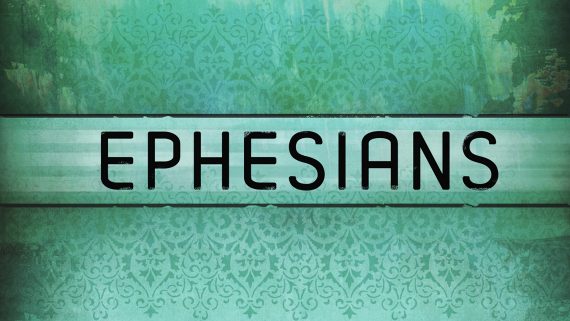
We pick back up with this idea in Ephesians 3:8.
Ephesians 3:8. To me, who am less than the least of all the saints, this grace was given,
In Ephesians 3:7, Paul said he was a minister, a servant running through the dust. Here, he says that he is the least of all the saints. The term least could also be translated very small, quite unimportant, or insignificant.[3] The best translation is exactly what we have here in the NKJV. It is not just that he was the least of all the saints, but he was less than the least.
He wasn’t just saying this; this wasn’t false humility. Paul really believed it. In 1 Timothy 1:15 he states a similar idea when he calls himself the chief of all sinners. In 1 Corinthians 15:9, he is the least of the apostles.
I don’t think Paul was one of those who was proud of his humility. He wasn’t the type to brag about his humility. He said things like this, because he was convinced of how great a sinner he was. He remembered all that he had done to persecute and destroy the church in his former years, and it weighed on him. Yes, he knew that he was forgiven and that all of his sins were washed away, but he knew that he didn’t deserve it.
A lot of Christians think that the more mature you become and the closer to God you get, the less you sin. While this is true, it seems to me that the closer we get to God, the more aware we become of how sinful we really are. It’s like light – since God is light. The closer you get to a light, the brighter the light becomes, and the more flaws the light reveals.

This is why assurance of salvation should never and can never be based on your works. Assurance of salvation is based on Christ and what He has done for us, not on ourselves and what we have to do. If you are basing assurance on your works, you will never have it because as you mature in your Christian walk, if you are honest, you will only think you are getting more and more sinful. This is what we see with Paul here. He calls himself the least of all the saints – because he is convinced of his sinfulness.
Nevertheless, Paul accomplished quite a bit, didn’t he? So what separates us from Paul? In my opinion, nothing except willingness. You know, if the truth were to be known, I think Christians today have greater opportunity and greater possibility to serve God than Paul did. I have heard some Christians, when confronted with their lack of activity and dedication say, “Well, I’m not Paul.” That’s exactly right. You’re not Paul. The difference between him and you is that you have more opportunities and more resources than he ever had.
The reason God used Paul so much is because Paul was willing to do what he could. He says he was the least of the saints and the chief of sinners, but we see how God used him anyway. If God can use Paul, God can definitely use you – if you are only willing and ready. The rest of Ephesians 3:8 and on into Ephesians 3:9 tells us what ministry God gave Paul.
Ephesians 3:8-9. … that I should preach among the Gentiles the unsearchable riches of Christ, and to make all see what is the fellowship of the mystery,
Paul’s God given task was to preach. These verses show the two things he was to preach. First in Ephesians 3:8, he was to preach to the Gentiles the unsearchable riches of Christ. This is the truth found in chapter 1 of Ephesians. Second, in Ephesians 3:9, he was to preach about the fellowship of the mystery which is the truth found in Ephesians 2. So this statement by Paul is a brief summary of Ephesians 1-2.
 The word unsearchable means that these riches of Christ are so great that they cannot adequately be explained or even understood. They are beyond finding out. They are without explanation or definition. You cannot fully explore them. You cannot delineate them. They are beyond description. They are beyond enumeration. You cannot catalog them. You cannot create in inventory list.
The word unsearchable means that these riches of Christ are so great that they cannot adequately be explained or even understood. They are beyond finding out. They are without explanation or definition. You cannot fully explore them. You cannot delineate them. They are beyond description. They are beyond enumeration. You cannot catalog them. You cannot create in inventory list.
Let me put it another way. How many waves are on the ocean? The answer is that there are an infinite number of waves, because they just keep on coming. It is the same with the riches that we have in Christ. We cannot number them because they just keep on coming. You think the Duracell battery never stops? Just think about the riches in Christ. They truly are without end.
Paul mentioned some of the riches we have in Christ in Ephesians 1, but when compared with what Christ still has for us, Ephesians 1 is like a single snowflake in comparison to all the snowflakes that have ever fallen and ever will fall.
The unsearchable riches of Christ was the first thing he preached, the second, as we saw in Ephesians 3:9 is the fellowship of the mystery.
Remember Ephesians 2? Even though we were sinners and separated from God and each other, Christ came and brought us all together into one unified body. This is what Paul preached.
Since Paul preached it, does this mean that Paul made it up? No. The rest of Ephesians 3:9 says that this message originated with God when He created the universe.
Ephesians 3:9. … which from the beginning of the ages has been hidden in God who created all things through Jesus Christ;
Remember, according to Ephesians 3:5, this mystery was hidden for ages and generations, but was made known by the Holy Spirit to God’s apostles and prophets. Paul here in Ephesians 3:9, wants to make sure that we realize that this mystery was NOT an invention of Paul’s, nor was it a sudden decision by God. It was God’s plan from the very beginning of the ages. It was hidden in God, meaning we didn’t know it, but God had it planned from creation.[4]
Many things are for God to know and his creatures to find out (Prov 25:2). But when he does reveal things to us, as he did here to Paul, it is our responsibility to shout them from the rooftops, to share it with all who will hear. This is how the Gospel message should be for us. God did not give us the Gospel of Salvation so we could hoard it and hide it, but so that we could share it and shout it.
That is what Paul did here with the mystery revealed to him. Paul, the prisoner of Jesus Christ, was revealed the plan of the mystery and as a result he preached about this mystery to all. Paul’s God-given task was to preach to the Gentiles the mystery revealed to him in Christ.
And what was this mystery? We have discussed this before. The mystery is that all people are welcome into God’s family, the church, regardless of race, background, morality, sex, age, or anything else that tends to divide humans. With God there is no “inner group.” No favorites. No “us vs. them.” With God, all are “in.” All are accepted. All are forgiven. All are welcome.
And God has formed His new people into the church. This is the mystery that God has known, and been seeking to reveal since the beginning, and which the prophets and apostles wrote about in Scripture, but which few really understood until Jesus fully revealed the truth of mystery through His ministry, life, death, and resurrection. And now Paul has become a messenger of this mystery, making it known to the rest of the world.
Now why did God do this? What is the purpose of bringing diverse groups of people into one body, the church? Paul explains why in Ephesians 3:10-11.
The Purpose of the Mystery (Ephesians 3:10-11)
Ephesians 3:10-11. to the intent (another word for intent is purpose, so here we have the purpose of the mystery) that now the manifold wisdom of God might be made known by the church to the principalities and powers in the heavenly places …
What does that mean? Well first, we need to know who or what the principalities and powers in the heavenly places are. A lot of people think that the terms “principalities and powers” refer to angels and demons. But this is not true.
Principalities is the Greek word archais, and it means rulers, princes, or chiefs. We briefly discussed this term in Ephesians 1:21 and will look at it in greater detail in Ephesians 6:12 (cf. also Col 1:16; 2:10, 15; 1 Cor 15:24; Rom 8:38).
 The word for powers is not dunamis, the power of God which we saw in Ephesians 3:7. Here, the Greek word is exousias. It also refers to rulers and authorities (Eph 1:21; Col 1:16; 2:10, 15; 1 Pet 3:22; 1 Cor 15:24). Together, the terms refer to earthly rulers, nations, institutions, and powers that dominate this world (cf. Dan 4:35, 10:13). Yes, there is a spiritual dimension behind these earthly powers, but this spiritual dimension reveals itself through earthly rulers, powers, and authorities that seek to control, dominate, and bring tyranny upon this world. We are seeing the powers at work right now as those in authority seek to use their positions to enrich themselves and control everybody else through tyranny.
The word for powers is not dunamis, the power of God which we saw in Ephesians 3:7. Here, the Greek word is exousias. It also refers to rulers and authorities (Eph 1:21; Col 1:16; 2:10, 15; 1 Pet 3:22; 1 Cor 15:24). Together, the terms refer to earthly rulers, nations, institutions, and powers that dominate this world (cf. Dan 4:35, 10:13). Yes, there is a spiritual dimension behind these earthly powers, but this spiritual dimension reveals itself through earthly rulers, powers, and authorities that seek to control, dominate, and bring tyranny upon this world. We are seeing the powers at work right now as those in authority seek to use their positions to enrich themselves and control everybody else through tyranny.
This, of course, is not a new problem. It has always been a problem. This is why Paul was writing about it in his day. The Roman Empire sought to dominate and control as well.
And Christians who desire freedom, liberty, and peace, have always wondered what to do about it.
Paul’s answer here is as shocking today as it was then.
Paul is saying that the mystery of the gospel directly challenges the powers of this world, and even seeks to correct the abuses of the powers by showing them a different and better way to live.
In other words, the church is God’s solution to the problem of abusive earthly powers.
Why does the church exist? Why did God decided to unite Jews and Gentiles into one body in Christ? The reason, according to Ephesians 3:10 is to teach and correct the principalities and powers of this world.
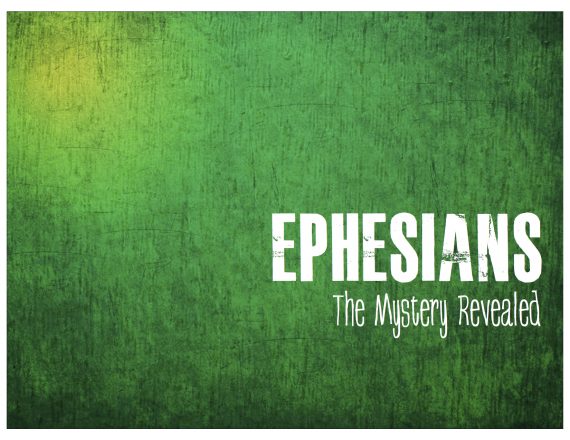
And this is not a new plan of God. Ephesians 3:11 shows that this has always been God’s plan.
Ephesians 3:11. … according to the eternal purpose which He accomplished in Christ Jesus our Lord,
In Ephesians 3:9, God’s plan of the mystery was from the beginning of the ages, that is, from the beginning of time, or from the beginning of creation. Here in Ephesians 3:11, God’s plan to teach the earthly powers was according to the eternal purpose of God.
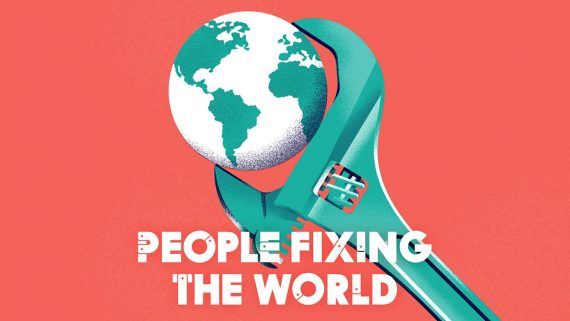
Do you want to know what this means? This verse tells us that the church is the central goal of history. The church is the eternal purpose of God for human history. The church is the reason the universe was created![9] Think about that. What level of importance do you place on the church? If you were to make a list of your top ten priorities for this week, where would church come in on the list? Would church even be on your list?
On God’s list of priorities, the church is number 1. God’s reason for creating the universe was to create the church – the mystery kept hidden for ages and generations. And the purpose of the church was to teach the world how to behave.
When we see the world falling part, and we complain about all the problems in the world, guess whose fault it is? It’s the fault of the church. When the world falls apart, it is because the church is doing a poor job of showing the world how to behave. Jesus showed us how to behave so we can show the world how to behave. This is Paul’s point in Ephesians 3:12-13.
Ephesians 3:12. … in whom we have boldness and access with confidence through faith in Him.
I know it sound challenging. We have to show the world how to properly live? Well, guess what? We’re not doing it alone. Jesus is leading the way. Jesus has led the way. All we have to do is follow His example. Paul is following the example of Jesus, and so should we.
And since we have the perfect example in Jesus (Ephesians 2), and since we have access to the riches and power of Jesus (Ephesians 1), we can follow Jesus with boldness. We can access our riches and inheritance with confidence through faith in Him.
In Ephesians 3:13 Paul says this is what he has done, and so this is what the Ephesians Christians can do as well.
Ephesians 3:13. Therefore I ask that you do not lose heart at my tribulations for you, which is your glory.
Remember, he began in Ephesians 3:1 by talking about how he was a prisoner of Jesus Christ for the sake of the Gentiles. That might be a troubling thought for them, so he has spent several verses assuring them that what he is going through is not a bad thing, but it is exactly what God wants.
Therefore, Paul asks them not to lose heart because of his tribulations, his trials, his troubles, because, he says, they are for your glory. He’s saying, “Yes, I am a prisoner, but I am a prisoner because I did what God wanted me to do – namely, share the Gospel with you.” And though Paul doesn’t say it here, Paul’s goal is to also share the gospel with the people in Rome, and potentially even to the greatest human power of all, Caesar.

All of us who follow Jesus want the world to change for the better. But few of us understand how to change the world. Yes, we can vote, and contact politicians, and support causes and organizations we believe in, but according to Paul, the best way to fix the world is to follow the example of Jesus by living in peace with one another. As Christians live in peace with each other, we give an example to the world of how peace can be achieved.
Jesus is the perfect example to us of how this works, and Paul was an example to the Ephesian Christians, and now we can follow their example and live in peace with one another as well. Indeed, this is the exact point Paul goes on to make in the rest of Ephesians 3. We will pick up with Ephesians 3:14 next time.
Footnotes for the Study on Ephesians 3:8-13
[3] McCalley, 30.
[4] This is an excellent verse in defense of Molinism (The Middle Knowledge of God). This verse does not say that this was God’s plan from before creation, it just says that it was God’s plan from creation. Prior to creation, there were innumerable worlds which God could have created. He scanned the possibilities, picked one he liked, and created it. It is this moment of picking to the logical next step of creating that verse 9 is talking about. See The Only Wise God by William Lane Craig.





 Second, the human mind is quite susceptible to the power of suggestion. This is also true of dreams. I am sure you have noticed that quite often, your dreams somewhat follow the events or experiences or worries that have been most at the forefront of your mind during the previous few days. If you are worried about a test at school, or presentation at work, or some situation with your spouse, you are likely to have some dreams about these things.
Second, the human mind is quite susceptible to the power of suggestion. This is also true of dreams. I am sure you have noticed that quite often, your dreams somewhat follow the events or experiences or worries that have been most at the forefront of your mind during the previous few days. If you are worried about a test at school, or presentation at work, or some situation with your spouse, you are likely to have some dreams about these things.





 And as Paul points out in the last part of Ephesians 2:20, Jesus Christ is the chief cornerstone. In other words, Jesus Christ is the central truth of Scripture, to whom all Scripture points, and in whom all Scripture is fulfilled. Jesus is the scarlet thread on every page. He is the fulfillment of every law. He is the beginning and the end. He is what it is all about (John 5:39).
And as Paul points out in the last part of Ephesians 2:20, Jesus Christ is the chief cornerstone. In other words, Jesus Christ is the central truth of Scripture, to whom all Scripture points, and in whom all Scripture is fulfilled. Jesus is the scarlet thread on every page. He is the fulfillment of every law. He is the beginning and the end. He is what it is all about (John 5:39).
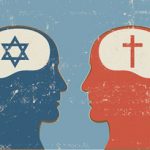



 That is the way it used to be. But now, Paul says in Ephesians 2:13, in Christ Jesus, the Ephesian Gentiles, who were far off have been brought near.
That is the way it used to be. But now, Paul says in Ephesians 2:13, in Christ Jesus, the Ephesian Gentiles, who were far off have been brought near. But, Paul says Jesus Christ has torn this wall down. Just like when He died on the cross, the veil in the temple was torn from top to bottom, showing that the dividing wall between God and man had been breached, Jesus Christ has also made it possible for all to come before God—Jew and Gentile alike. Christ is Our Peace.
But, Paul says Jesus Christ has torn this wall down. Just like when He died on the cross, the veil in the temple was torn from top to bottom, showing that the dividing wall between God and man had been breached, Jesus Christ has also made it possible for all to come before God—Jew and Gentile alike. Christ is Our Peace.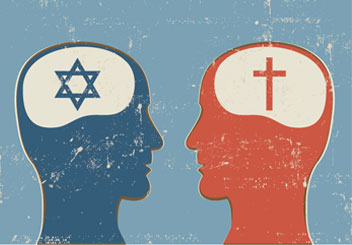 As you can see, peace is the central idea of Paul’s thought pattern here. Christ Makes Peace. Christ is our peace by abolishing the enmity in Himself and making the two into one. In this way, Christ makes Peace.
As you can see, peace is the central idea of Paul’s thought pattern here. Christ Makes Peace. Christ is our peace by abolishing the enmity in Himself and making the two into one. In this way, Christ makes Peace. Second, Jesus Christ did this through the cross. In Ephesians 2:15, Christ did it in Himself, here Paul repeats himself again, but elaborates as well. It was not just in Himself, it was specifically in what He did on the cross.
Second, Jesus Christ did this through the cross. In Ephesians 2:15, Christ did it in Himself, here Paul repeats himself again, but elaborates as well. It was not just in Himself, it was specifically in what He did on the cross.
 I went on to argue that the word for “sons” in both “sons of the kingdom” and “sons of wickedness” is better understood as “offspring,” which in the context, would indicate the behavior or results that come from living according to the ideas and teachings of the Kingdom of God vs. the kingdom of darkness.
I went on to argue that the word for “sons” in both “sons of the kingdom” and “sons of wickedness” is better understood as “offspring,” which in the context, would indicate the behavior or results that come from living according to the ideas and teachings of the Kingdom of God vs. the kingdom of darkness.



 Paul writes in Ephesians 2:7… That in the ages to come He might show the exceeding riches of His grace in His kindness toward us in Christ Jesus.
Paul writes in Ephesians 2:7… That in the ages to come He might show the exceeding riches of His grace in His kindness toward us in Christ Jesus.